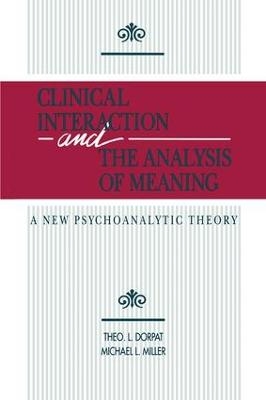
Clinical Interaction and the Analysis of Meaning
Routledge (Verlag)
978-1-138-87242-4 (ISBN)
In Section II, "Interactional Theory," Miller reverses the direction of inquiry. He begins with the literature on cognitive development and functioning, and proceeds to mine it for concepts relevant to the clinical process. He shows how a revised understanding of the operation of cognition and affect can impart new meaning to basic clinical concepts such as resistance, transference, and level of psychopathology. In Section III, "Applications and Exemplifications," Dorpat concludes this exemplary collaboration by exploring select topics from the standpoint of his and Miller's new psychoanalytic theory.
At the heart of the authors' endeavor it "meaning analysis," a concept that integrates an up-to-date model of human information processing with the traditional goals of psychoanalysis. The patient approaches the clinical encounter, they argue, with cognitive-affective schemas that are the accumulatice product of his life experience to date; the manifold meanings ascribed to the clinical interaction must be understood as the product of these schemas rather than as distortions deriving from unconscious, drive-related fantasies. The therapist's goal is to make the patient's meaning-making conscious and thus available for introspection.
Theo L. Dorpat, M.D., is Training and Supervising Analyst and former Director, Seattle Institute for Psychoanalysis, and Clinical Professor, Department of Psychiatry and Behavioral Sciences, University of Washington School of Medicine. The author of over 225 scientific publications, Dr. Dorpat has twice received the Seattle Psychoanalytic Society's Edward D. Hoedemaker Memorial Prize for best clinical case study. Michael L. Miller, Ph.D., is Clinical Associate Professor, Department of Psychiatry and Behavioral Sciences, University of Washington School of Medicine, and Clinical Associate Professor, Department of Psychology, University of Washington. He is currently completing psychoanalytic training at the Seattle Institute for Psychoanalysis.
I. Critique of Classical Psychoanalytic Theory 1. Freud's Theory of Cognition 2. The Primary Process Revisited 3. On Unconscious Fantasy 4. Unconscious Pathogenic Beliefs or Unconscious Fantasy? Psychoanalytic Theories on Psychic Trauma II. Interactional Theory 5. Basic Principles of Mental Organization 6. The Mind in Operation 7. Defense and Psychopathology 8. Process and Technique 9. A Clinical Study III. Applications and Exemplifications 10. Social versus Asocial Perspectives on Transference 11. Self-fulfulling Prophecies and the Repetition Compulsion: An Interaction Perspective 12. Interactional Aspects of Defense 13. Unconscious Meaning Analysis, Unconscious Perception, the Day Residue, and Dreaming
| Erscheint lt. Verlag | 21.1.2019 |
|---|---|
| Verlagsort | London |
| Sprache | englisch |
| Maße | 152 x 229 mm |
| Gewicht | 476 g |
| Themenwelt | Geisteswissenschaften ► Psychologie ► Psychoanalyse / Tiefenpsychologie |
| Medizin / Pharmazie ► Medizinische Fachgebiete ► Psychiatrie / Psychotherapie | |
| Sozialwissenschaften ► Pädagogik ► Schulpädagogik / Grundschule | |
| ISBN-10 | 1-138-87242-3 / 1138872423 |
| ISBN-13 | 978-1-138-87242-4 / 9781138872424 |
| Zustand | Neuware |
| Haben Sie eine Frage zum Produkt? |
aus dem Bereich


